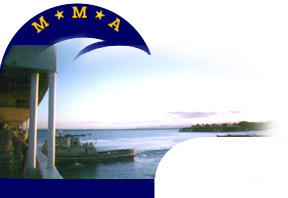
Captain's Log for Wednesday, 16 February 2000
|
As of 0700 Eastern Standard time, 1200 GMT and 0800 ship time, the Empire State was underway from Barcelona, Spain, homeward bound to Buzzards Bay, Massachusetts. She was located at 33 degrees 07 minutes North Latitude, 059 degrees 48 minutes West Longitude, steering course 317 degrees true at 16 knots. That position puts her approximately 250 nautical miles east of Bermuda. The weather was cloudy with winds out of the west at 10 knots. Barometric pressure was 1021 millibars. The air temperature was 63 degrees and the sea water temperature was 66 degrees. The depth of water beneath the keel was 2600 fathoms. The ship is riding well on small southwesterly swells. CAPTAIN'S LOG Who says that humans are without the intuitive sense of direction present in so many lesser mammals? We just came right to 317 degrees true, heading northwest for Cape Cod and the entire ship seemed to know it instantly. From the bilge to the flying bridge, moods quickly changed, all completely without announcement. Are these cadets distantly related to homing pigeons or the swallows of Capistrano? By listening to the animated, bird like chatter on the mess deck, one would conclude that Buzzards Bay is on the horizon. Some have begun to prepare their finery for arrival and I saw several young lads packing their bags. Alas, the agony of it all. These hapless freshmen are about to learn what the prudent seniors already know; the final four days of this ocean voyage actually last for three full weeks. Just this morning, Empire State sailed headlong into the mysterious "Cape Cod Time Triangle" where time is slowed and seemingly stopped. Nine o'clock is followed by eight each night as chronometers are oft times reset. Time is running backward and the Navigator cannot adequately explain the apparent negative speed of advance. It seems that the further we go, the behinder we get. "Why aren't we there yet?" is the whine from the freshman hold. Cadets are smitten by long forgotten, time induced maladies. Called "Channel fever" by some, "Get home-itis" by others, the name of the disease is irrelevant. The effect is obvious. They clean and re-clean, pack and re-pack, walk and re-walk but they go nowhere and do nothing. Anxiety grows with each agonizingly slow minute that passes. Their boots polish and re-polish every inch of open deck or passage as they scuff from here to there. Going nowhere. The infection will spread and soon engulf the entire ship. By the time we anchor in Cape Cod Bay Saturday, even veterans of many Sea Terms will be seen hanging on the rail facing shore, staring into the dark, hoping time will pass faster. But it won't. It will be Sunday morning at 0950 before the first line from the Empire State touches our homeland. Nothing can change that, for time and tide wait for no man...and they won't hurry for us either. Thankfully, the Time Triangle is conveniently located between pressure gradients and the barometer is steady. Light winds and pleasant seas are therapeutic. We are looking to the future with hopes that the weather is good when we finally break out of the Triangle on Sunday. Please, think of us in peril on the sea... See You Tomorrow from deep within the much dreaded..."Cape Cod Time Triangle" QUESTIONS FOR THURSDAY 17 FEBRUARY 2000 GEOGRAPHY: This week we celebrated Valentine's Day. But love is in the air in our mystery spot. It's a nation in the America's flanked by two mountain ranges, the Sierra Madre Occidental and the Sierra Madre Oriental. What country is it? SCIENCE: During their voyage the cadets have seen many migrating birds fly by. What effect is global warming having on the migration of birds? HISTORY: The T.S. Empire State will return home this Sunday and travel down the famous Cape Cod Canal. In what year was the Cape Cod Canal opened? MATH: How many milliliters equal one liter? How many centimeters equal one meter? One thousand meters equal one________. ANSWERS FOR WEDNESDAY 16 FEBRUARY 2000 GEOGRAPHY: Catalonia. And the dance is called The Sardana. SCIENCE: In the winter of 1994 a huge chunk of ice the size of Bourne broke off the Larsen ice sheet in the Antarctic. The ice is 200 meters thick. It is impossible, however, to put a single incident like this down to global warming. HISTORY: Hercules MATH: Milli means 1/1000 or .001; Centi means 1/100 or .01; Kilo means 1,000 or 1,000/1.
|
|
||||||||||||||||||||||||||||||||||||||||||||||||||